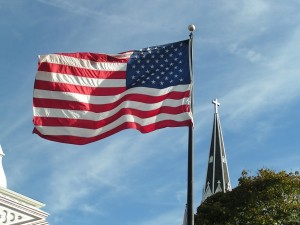Lately I’ve been existing in a state of unrelenting humiliation and bewilderment. You see, I am an evangelical Christian who would describe himself as right-of-center politically. Countless polls, headlines, and consistent primary victories are showing that those who supposedly think like me are consumed with affection for one Donald Trump. Truth be told, it makes me shudder.
As I reach for the Mylanta I will stop short of calling into question the Christian convictions of actual Trump supporters. Only God can judge the attitudes of the heart and some of the gripes many of them voting for him have with our present political system are very real and legitimate. But it does completely befuddle me given the outrageous and disgusting things he has said and done how any follower of Jesus would want to pull a lever for him. That Donald Trump has captured the support of veritable Jesus enthusiasts and won endorsements from a couple of notable evangelical figures across the fruited plain cries out for a much deeper analysis. With some exceptions, most of my Christian friends with conservative leanings know few if any Trump fans at their churches. I believe it can be boiled down to this: the perception that most center-right Christians who are aghast at the prospect of Donald Trump receiving a major parties nomination and the widespread belief that most Christians share their revulsion is inconsequential because there really are not that many evangelicals in America if you care to actually count.
Does that sound surprising? The best research and data bears this out.
What else could explain Trump’s continued success at the polls as conservative evangelical leaders and pastors like Russell Moore, Max Lucado, and several others who are usually pretty quiet when it comes to politics denounce his indecency and repulsive approach to campaigning? Their words do not seem to sway the masses so much because the people they already influence usually agree with them anyway. I would love to be wrong and maybe I am.
But I don’t think I am. John S. Dickerson’s 2013 book The Great Evangelical Recession outlines the state of evangelical Christianity in America today, relying on some of the best data available, and offers sober wisdom and solid counsel to churches that are committed to advancing the Kingdom of God in a culture that is increasingly hostile and actively rejecting the remaining vestiges of Judeo-Christian influence in our society. Chock full of insights and relevant observations, two things Dickerson offers particularly struck me when I considered Trump’s popularity among “evangelicals.”
The first is that evangelicals absolutely do not constitute a “Silent Majority” of any kind because they are not a majority whatsoever. Not even close. For all their historic presence and institutions in the United States, they do not even comprise a remarkable minority. Mind you, this is not my personal perspective as a millennial Christian who is well aware of my peers high-tailing it out of church. This is real, dense, painstakingly detailed research.
Dickerson is careful to mention that when he speaks of what an evangelical is he is not referring to people who identify with some kind of “born-again” cultural Protestantism and are not particularly faithful in any measurable way. The meticulous studies the author cites take fully into account the rise of the “nones” and reveal that devout, practicing evangelical Christians are at best maybe 10% of the American populace. They are also largely concentrated in certain regions of country. Religion reporter Christine Wicker puts the number at 7%. The Barna Group says the same. Also in agreement with that figure is Notre Dame Professor of Sociology Dr. Christian Smith. David Olson of the American Church Research Project thinks the percentage of American evangelicals is 8.9%. That slightly higher number is dubious as Olson’s model relies on churches to self-report their attendance and congregational participation, and Dickerson notes that he has seen churches “round up or inflate their own numbers.” All counted, American evangelicals number approximately the population of the state of New York.
The second insight from Dickerson that dovetails with the seemingly surprising low numbers is that evangelical Christians do not evangelize. Sound even more surprising? The author cites George Barna’s recent book Revolution wherein Barna writes that “[a]t any given time, a majority of believers do not have a specific person in mind for whom they are praying in the hope that the person will be saved…Most churched Christians believe that since they are not gifted in evangelism, such outreach is not a significant responsibility of theirs.” Then there is author Brad Waggoner who conducted a survey of 2,500 churchgoing Protestants and found that over the course of six months only 29% had shared how to become a Christian with someone more than twice, and 57% had not done so at all.
So perhaps the larger questions for evangelicals who lean right (or lean left for that matter) do not pertain to how any in our tribe could possibly support someone like Donald Trump but about our own reluctance to share the gospel. Why are we keeping the best news in the world to ourselves? One encounter with Christ Jesus was enough for an apostle to consider everything that was to his profit as trash for the surpassing greatness of knowing him (Php. 3:8). Would that the American church embrace such a surrendered attitude.
______________________
Photo Credit: FreeImages.com













